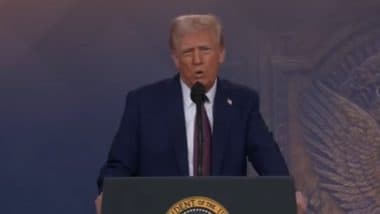Mumbai, September 3: South Korean society has been suffering a deepfake pornography crisis involving young students, primarily minors, as victims of the online circulation of their altered and fake sexually explicit images. The deepfake pornography was carried out via multiple channels on the social media app Telegram, whose servers avoid detection during investigations since they are located outside South Korea.
The deepfake crisis of circulation of pornographic material of underage students has hit schools of South Korea. Journalist Ms Ko's report in the Hankyoreh newspaper revealed that more than 500 schools and universities were under the target, and the suspected perpetrators were sometimes teenagers. Schoolgirls would often get an anonymous message on their Telegram account from unknown users, who shared their explicit but fake pictures and blackmailed them. Women in South Korea have removed their pictures online due to fear of being exploited next. South Korean Sex Scandal: Deepfake Porn vs Hentai Porn; Korean Celebrities Become Prime Targets of Abusive and Disturbing Trend.
Criticism of South Korean Government
Amidst this technological crisis around deepfake sexual content, the South Korean government has come under strict criticism from the media, activists and general citizens, who were concerned about their online security and privacy. In a BBC report, a South Korean university student Ah-eun was reported saying, "We are frustrated and angry that we are having to censor our behaviour and our use of social media when we have done nothing wrong." It reflects the widespread displeasure of South Koreans in their government, who are not being able to stop the deepfake crisis in the country.
Moreover, since the anonymity of the perpetrators makes it challenging to catch them, the South Korean authorities have been dismissive about the reports regarding the issue, allegedly claiming that it was “not really a crime” as “the photos were fake”. South Korea Deepfake Porn Scandal: YG Entertainment To Remove, Block and Take Legal Action To Shield Their K-Pop Artists From Explicit Content – Read Full Statement Here.
The report further says that South Korea’s Advocacy Centre for Online Sexual Abuse Victims (ACOSAV) has marked a sharp rise in the number of underage victims of deepfake pornography in the country. Women's rights organisations blame society's structural sexism as the leading cause behind this crisis. It stands as a criticism of South Korean President Yoon Suk Yeol, who has reportedly denied the existence of structural sexism, cut funding to support groups for victims and was working towards abolishing the government’s gender equality ministry.
Government's Response to Deepfake Crisis
South Korea's politicians and the police have promised to investigate the ongoing deepfake crimes. The Seoul National Police Agency, on September 1, announced its plans to investigate Telegram's role in circulating the fake pornographic images of minors. Meanwhile, human rights and gender activists in South Korea have been calling for regulations of Telegram and even a government ban on the app.
President Yoon Suk Yeol acknowledged the crisis and urged the concerned authorities to end the country's digital sex crime crisis. He said, as quoted in The Star report, to "thoroughly investigate and address these digital sex crimes to eradicate them". The President emphasised the need to build a "healthy media culture". He said, "Although it is often dismissed as ‘just a prank,’ it is clearly a criminal act that exploits technology to hide behind the shield of anonymity." The President further said in a cabinet meeting, "Recently, deepfake videos targeting an unspecified number of people have been circulating rapidly on social media. The victims are often minors and the perpetrators are mostly teenagers."
South Korean media regulators will be meeting on September 4 to discuss plans to tackle the deepfake crisis. Meanwhile, Telegram claimed that it actively monitored the app and used artificial intelligence (AI) tools to remove such pieces of content. It told the BBC in a statement that it "actively combats harmful content on its platform, including illegal pornography".
(The above story first appeared on LatestLY on Sep 03, 2024 04:55 PM IST. For more news and updates on politics, world, sports, entertainment and lifestyle, log on to our website latestly.com).













 Quickly
Quickly




















